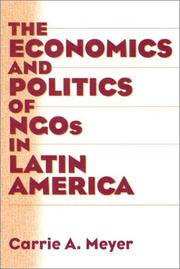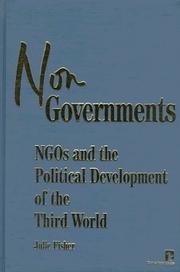| Listing 1 - 10 of 144 | << page >> |
Sort by
|

ISBN: 027597099X Year: 2000 Publisher: Westport (Conn.) Praeger
Abstract | Keywords | Export | Availability | Bookmark
 Loading...
Loading...Choose an application
- Reference Manager
- EndNote
- RefWorks (Direct export to RefWorks)
Book

ISBN: 9789055504855 Year: 2011 Publisher: Leuven HIVA
Abstract | Keywords | Export | Availability | Bookmark
 Loading...
Loading...Choose an application
- Reference Manager
- EndNote
- RefWorks (Direct export to RefWorks)
#SBIB:327.4H74 --- Ontwikkelingshulp en -samenwerking --- Academic collection
Book
ISSN: 20743602 20743599 ISBN: 9789264056435 9789264056794 Year: 2009 Publisher: Paris OECD
Abstract | Keywords | Export | Availability | Bookmark
 Loading...
Loading...Choose an application
- Reference Manager
- EndNote
- RefWorks (Direct export to RefWorks)
In the Accra Agenda for Action (2008), donors and developing country governments commit to deepening their engagement with civil society organisations (CSOs). Better aid requires a broader understanding of the aid effectiveness agenda and a place for CSOs as development actors in their own right and as aid donors, recipients and partners. This book is a resource for implementing the recommendations on civil society and aid effectiveness emerging from the Accra High Level Forum and its preparatory process. These recommendations address a broad community, including developing country governments, donors, and CSOs from developing and developed countries.
#SBIB:327.4H74 --- #SBIB:35H415 --- Ontwikkelingshulp en -samenwerking --- Beleidscyclus: evaluatie
Book
ISBN: 1859341233 Year: 2000 Publisher: Baltimore Johns Hopkins University Press
Abstract | Keywords | Export | Availability | Bookmark
 Loading...
Loading...Choose an application
- Reference Manager
- EndNote
- RefWorks (Direct export to RefWorks)
Charities --- Charity organization --- Oeuvres de bienfaisance --- Organisation --- #SBIB:327.4H74 --- Ontwikkelingshulp en -samenwerking
Book
ISBN: 8271720104 Year: 1995 Publisher: Hvaler Norwegian National Committee of the World Decade for Cultural Development
Abstract | Keywords | Export | Availability | Bookmark
 Loading...
Loading...Choose an application
- Reference Manager
- EndNote
- RefWorks (Direct export to RefWorks)

ISBN: 1565490746 1565490754 Year: 1998 Publisher: West Hartford, Conn. Kumarian Press
Abstract | Keywords | Export | Availability | Bookmark
 Loading...
Loading...Choose an application
- Reference Manager
- EndNote
- RefWorks (Direct export to RefWorks)
Democracy --- Non-governmental organizations --- Sustainable development --- #SBIB:327.4H74 --- Ontwikkelingshulp en -samenwerking --- Economic order
Book
Abstract | Keywords | Export | Availability | Bookmark
 Loading...
Loading...Choose an application
- Reference Manager
- EndNote
- RefWorks (Direct export to RefWorks)
Book
ISBN: 2893720374 9782893720371 Year: 1990 Publisher: Montréal Ed. du Fleuve
Abstract | Keywords | Export | Availability | Bookmark
 Loading...
Loading...Choose an application
- Reference Manager
- EndNote
- RefWorks (Direct export to RefWorks)
Book
ISBN: 9789055504299 Year: 2007 Publisher: Leuven KU Leuven. Hoger Instituut voor de Arbeid
Abstract | Keywords | Export | Availability | Bookmark
 Loading...
Loading...Choose an application
- Reference Manager
- EndNote
- RefWorks (Direct export to RefWorks)
De vierde pijler is de koepelnaam voor ontwikkelingsinitiatieven van organisaties die hun eigenlijke doelstellingen in een ander domein dan ontwikkelingssamenwerking situeren. Het gaat om initiatieven van vakbonden, sportclubs, scholen, bedrijven, verenigingen, ... Dit onderzoek kijkt naar het ontstaan van deze vierde pijler, wat er allemaal onder verstaan wordt en wat het draagvlak is.
Book
ISBN: 9780415656733 9780415656740 9780203077610 9781135132705 9781135132743 Year: 2014 Publisher: London Routledge
Abstract | Keywords | Export | Availability | Bookmark
 Loading...
Loading...Choose an application
- Reference Manager
- EndNote
- RefWorks (Direct export to RefWorks)
"How can international aid professionals manage to deal with the daily dilemmas of working for the wellbeing of people in countries other than their own? A scholar-activist and lifelong development practitioner seeks to answer that question in a book that provides a vivid and accessible insight into the world of aid--its people, ideas and values against the backdrop of a broader historical analysis of the contested ideals and politics of aid operations from the 1960s to the present day.Moving between aid-recipient countries, head office and global policy spaces, Rosalind Eyben critically examines her own behaviour to explore what happens when trying to improve people's lives in far-away countries and warns how self-deception may construct obstacles to the very change desired, considering the challenge to traditional aid practices posed by new donors like Brazil who speak of history and relationships. The book proposes that to help make this a better world, individuals and organisations working in international development must respond self-critically to the dilemmas of power and knowledge that shape aid's messy relations. Written in an accessible way with vignettes, stories and dialogue, this critical history of aid provides practical tools and methodology for students in development studies, anthropology and international studies and for development practitioners to adopt the habit of reflexivity when helping to make a better world"-- "This book examines what happens when we try to improve people's lives in far-away countries and warns how self-deception may construct obstacles to the very change desired. It considers the challenge to traditional aid practices posed by new donors like Brazil, China and India who speak of history, culture and relationships. This accessible critical history of aid provides practical tools and methodology for development practitioners, and students and researchers in development studies, anthropology and international studies to adopt the habit of reflexivity when helping to make a better world"--
| Listing 1 - 10 of 144 | << page >> |
Sort by
|

 Search
Search Feedback
Feedback About UniCat
About UniCat  Help
Help News
News